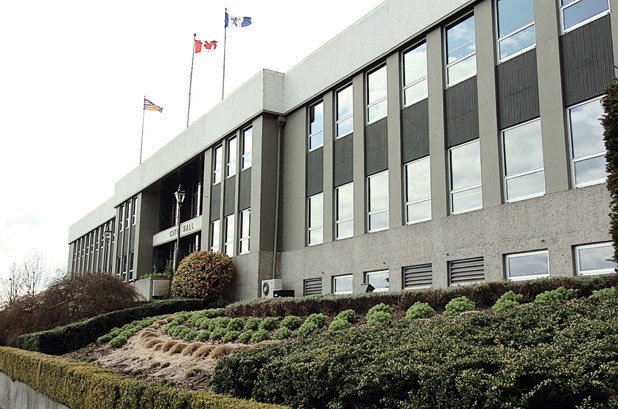New Westminster’s ethics commissioner has dismissed a claim that the mayor and a city councillor breached the Community Charter when considering a motion related to Metro Vancouver’s wastewater treatment plant.
The City of New Westminster recently released a December 2024 report from Jennifer Devins, the city’s ethics commissioner. It was in response to a complaint against Mayor Patrick Johnstone and Coun. Nadine Nakagawa under the code of conduct for council members.
According to the report, a complainant alleged Johnstone and Nakagawa had breached sections of the code of conduct and, by inference, a section of the Community Charter by participating and voting on a council motion related to the Metro Vancouver Regional District.
“I find no breach of the Community Charter prohibitions on conflict of interest and no breach of the code of conduct, and the complaint is dismissed in its entirety,” Devin concluded.
The complaint arose out of a June 10, 2024 meeting, where council, in a 3-3 vote, defeated a motion from Coun. Daniel Fontaine to ask Metro Vancouver to conduct a full, independent public inquiry into the North Shore wastewater treatment plant cost overruns. Johnstone, Nakagawa and Coun. Ruby Campbell opposed the motion, which was supported by Fontaine and councillors Paul Minhas and Tasha Henderson.
The subsequent complaint to the ethics commissioner alleged Johnstone and Nakagawa were in a conflict of interest with respect to their votes at the June 10 meeting due to their appointments to Metro Vancouver boards and committees. At that time, Johnstone was on the Metro Vancouver regional district’s board of directors and Nakagawa was the city’s alternate; Johnstone had also been appointed to a standing committee regarding the North Shore wastewater treatment plant and Nakagawa was on the region’s liquid waste committee.
In her decision, Devins dismissed the complaint that Johnstone and Nakagawa had breached the code of conduct.
“With respect to the complainant’s allegation that the respondents were in a conflict of interest because of their dual role as members of council and representatives of the MVRD, I also dismiss that complaint,” she wrote.
While Johnstone and Nakagawa would, as members of council appointed to a Metro Vancouver board or committee, have a loyalty to both council and the regional district, Devins said their pecuniary interest was “so remote or insignificant that it cannot reasonably be regarded as likely to have influenced them.” She said it is therefore deemed by the legislation not to be a conflict of interest.
“There is no evidence that either of the respondents’ objectivity or impartiality was compromised,” Devin wrote. “There is no evidence on which to conclude that either the issue of divided loyalties or the amount of compensation the respondents receive for being on the MVRD board and standing committees could reasonably be regarded as likely to have influenced their decision to vote against the motion.”
After considering written submissions from the complainant and both respondents, Devins determined that the respondents did not breach the code of conduct or the Community Charter.
Previous concerns
The complaint to the ethics commissioner is not the first time a community member or councillor has raised concerns about the June 2024 vote in New Westminster council chamber.
At the June 10, 2024 meeting, Fontaine urged council to support his motion calling for a public inquiry into the Metro Vancouver project. He said municipalities need to have a full understanding of how the North Shore wastewater treatment plant project’s cost soared to nearly $4 billion from its original $500-million budget.
At council’s June 24 meeting, a New West resident expressed concern about council’s decision not to support Fontaine’s motion. He also voiced concerns that Johnstone and Nakagawa had voted on the motion, even though they both received compensation for their positions at Metro Vancouver.
Fontaine questioned whose responsibility it is for council members to declare a conflict of interest.
“The onus is on the member of council to bring it forward,” replied Hanieh Berg, the city’s corporate officer.
Johnstone said council’s code of conduct includes a process via which a member of the public or a council member can file a concern, if a concern arises, around conflict of interest.
“That would be the proper path for a member of the public to raise that concern and have it investigated,” Johnstone said.
What is the ethics commissioner?
In June 2024, the City of New Westminster announced it had appointed Devins as its first-ever ethics commissioner.
As the city’s ethics commissioner, Devins is responsible for performing advisory, investigative, and educational services to support fair and transparent governance in relation to the council code of conduct bylaw. She will also provide advice and recommendations to council members regarding their ethical obligations and responsibilities and will produce materials aimed at helping community members understand the work being undertaken by the ethics commissioner.
In February 2024, councillors Fontaine and Minhas filed a complaint against Johnstone under council’s code of conduct. They alleged he had breached the code of conduct and the Community Charter when he attended the COP28 conference in Dubai in December 2023 and received complementary travel, meals, and accommodation.
In September 2024, Devins issued her first report as the city’s ethics commissioner. In that report, she determined that Johnstone had breached council’s code of conduct in relation to his attendance at the COP28 conference in Dubai in December 2023.
Devins concluded a portion of Johnstone’s costs were permitted, but others were not. She ruled that Johnstone’s contravention of Section105 of the Community Charter “was inadvertent and the result of an error in judgment made in good faith.”





